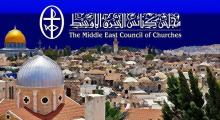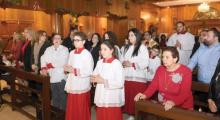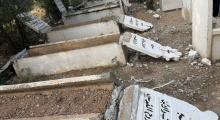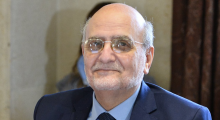Issued by the Catholic Center for Studies and Media - Jordan. Editor-in-chief Fr. Rif'at Bader - موقع أبونا abouna.org
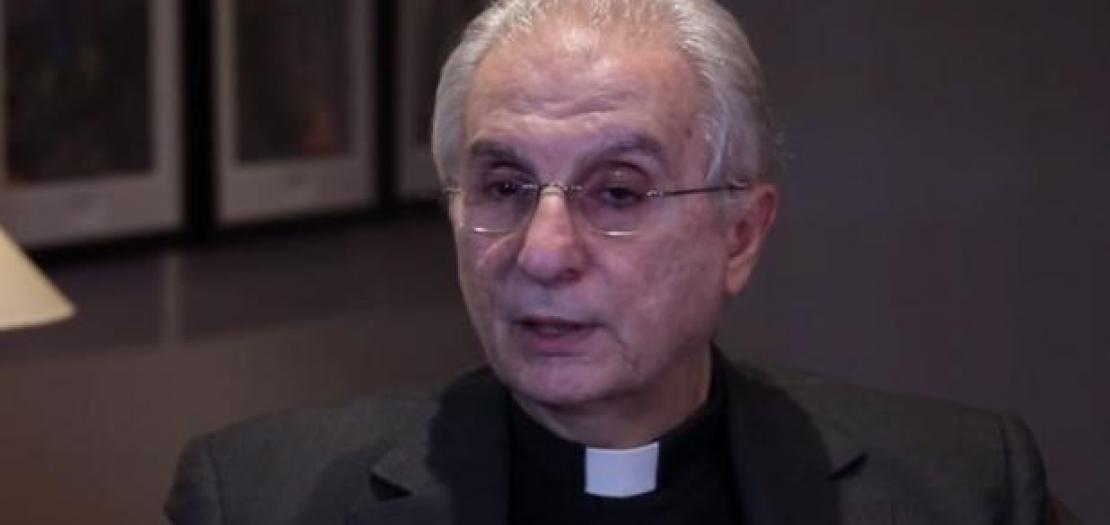
The Week of Prayer for Christian Unity celebrated by Christians all over the world between January 18 and 25 of every year is one of the primary pillars of the Middle East Council of Churches’ (MECC) mission. The MECC strives to build bridges connecting Christians and churches in the Middle East and all over the world ever since its foundation in 1974.
In this event, the department of Communication and Public Relations held an online meeting with the president of the National Evangelical Union in Lebanon and president of the Council on behalf of the Evangelical family HE Rev. Habib Badr. The virtual meeting shed the light on the importance of this week throughout history, the role of the ecumenical movement, especially in the Middle East, and the obstacles preventing it from taking place.
First, how important is the Week of Prayer for Christian Unity and how do you describe its goals?
Ecumenical churches around the world started celebrating the Week of Prayer for Christian Unity starting1908, including the Catholic Church. Catholic Franciscan friar Paul Wachsen started this ritual noting that he comes from an Anglian background; he then joined the Catholic Church before becoming a Franciscan friar. A few years later, the ecumenically oriented Evangelical Churches joined the Catholic Church in celebrating this week. When the World Council of Churches was founded in 1948 and the ecumenically oriented Greek Orthodox and Evangelical Churches joined, all Churches decided to celebrate this week dedicated to praying for our unity.
The idea behind the title “Week of Prayer for Christian Unity” is to unify Christians in prayer and later on unify the Churches. This requires us to pray together. Unity also translates in ideologies and theological discussions, two main concerns for some. This is why the path towards unifying churches was modified to become not only prayers but also discussions about main ideologies trying to bring Churches together in the hopes of achieving complete unity.
What do you think of the Ecumenical movement and how did you join it?
Those who know me would know that I have been interested in the Ecumenical movement from a very young age. The person who inspired me in this field was Dr. Charles Malek, my professor when I was majoring in philosophy. Dr. Malek is an Ecumenical person; he is one of the people who made the historical meeting happen between his Holiness Pope Paul VI and his Beatitude Ecumenical Orthodox Patriarch Athenagoras in 1964 in the Holy Land. The meeting was held after the communication and relation between the two Churches ran cold for 900 years. Dr. Charles Malek taught me and helped me explore and deepen my evangelism. He inspired me to join the theological world. This is when I became a pastor and joined the Ecumenical movement in 1973. I have also been working with the MECC ever since its third session in Cyprus in 1980, as I am now its president on behalf of the Evangelical family. Working in the Ecumenical field has always been my passion, even when it is going through a stagnant phase today and even if some people gave up on its progress, especially after the 20th century events. I see the obstacles but I know that achieving unity takes time. I am still fully committed to the Council and the Ecumenical movement.
Despite the unified core of faith, what would be, according to your experience, the reason Christians are not united yet, especially in the Middle East?
Christians around the world and in the Middle East have partaken in world discussions since the early twenties and thirties of last century between the Orthodox, East Orthodox and Evangelical Churches and even the Assyrian Church, despite it not being a member of the Council. These discussions addressed matters of faith and ideologies, many of which are coming to an end. Many documents have been issued putting an end to 70 years of discussions. The question we should be asking today is: what should we do with all these discussions? I think that one of the obstacles of the Ecumenical movement worldwide is the work of theologists and activists planning what moves should the Churches take next in order to implement the discussed and written agreements.
In the Middle East, however, the obstacles are different, starting with the pressure put on Christians such as emigration, oppression, economic crisis… happening in Lebanon and many other countries. All these unfortunate circumstances decrease the number of Christian components, which in its turn slow the Ecumenical work. We can see that through people emigrating and leaving the Middle East region or through Christian officials who are currently spending their time serving their people, providing them with the necessities of life and supporting their medical and educational needs; when they should be implementing and organizing dialogues and prayers with each other, or trying to find common grounds. I noticed in the last few years that we spend 90% of our time on activities that have nothing to do with unity in its traditional sense, but rather on working to secure the necessities of life ignoring the rise of emigration rates, especially in Lebanon after the Beirut Blast.
Despite all obstacles, the pursuit of unity is still relentless. I am sure that there are many areas we can benefit from. Not to mention, many Lebanese attempt through different initiatives to work on Christian Unity and even on unifying holidays and prayers on certain occasions, like the Annunciation in March, which is a celebration that unifies us in prayer with our Muslim fellows.
But today’s worries are the greatest obstacle to the Ecumenical progress. It negatively affects the Ecumenical movement and its financial support, because in order to move forward, several measures are needed, like traveling and assisting different meetings.
The Current focus of the Church on the necessities of life did take its toll on the Ecumenical movement work, however there is no concern regarding the future of the Ecumenical movement!
As you previously mentioned, the Christian presence in the Middle East is threatened by many factors, what do you have to say to the Christians in this region today?
The problem today is the pressure the Christian component is going through, just like many other entities because of the economic and political crisis. Noting that the number of Christians is smaller than other components in the region, he said that the path towards solving this problem consists in inviting civil leaderships to work towards peace, building a civil state, implementing civil laws, establishing democracy, the rule of law, the preservation of rights and all these factors building states that protect their people and preserve their rights. We are not capable of building an independent Christian state; therefore, it is necessary that we work on building a civil state that protects Christians as other citizens. However, this is not a task for the Church to work on since it cannot work in politics and legislation… it is the duty of Christian and non-Christian leaderships to build a civil state that insures freedom, equality, citizenship, democracy, and human rights to all its citizens no matter their religion.
The Ecumenical movement and the MECC are interested in this cause, but it is mandatory to cooperate with officials in order to achieve the desired goals or else we will fall in the unknown.
Finally, our main role is to be the witnesses of Jesus Christ, with every means at hand.


